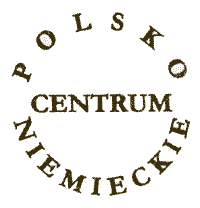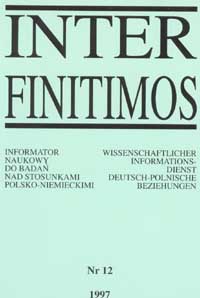Polish - German Centre Association

ul. Rajska 10/5
31- 124 Kraków
Phone/fax: 0048/12/6340757
e-mail: pdzentr@kr.onet.pl
Chairman: Jan Rydel, PhD
Vice-chairmen: Prof. Marek Wilczyński
Waldemar Bukowski, MA
Secretary: Isabel Röskau - Rydel, PhD
Treasurer: Ewa Waśko
Director: Zdzisław Noga, PhD
The Polish-German Centre Association was created in 1992 and was the initiative of the group of historians, political scientists and philologists associated with the Jagiellonian University, Pedagogical Academy in Cracow. Teachers and journalists, who recognised that there is a need for improving Polish-German relations and intensifying contacts between both nations, were also involved.
Our goal was - and still is - to present the ups and downs of Polish-German relations and - through learning about these - to endeavour to eliminate the prejudices and stereotypes existing on both sides.
For more than ten years now, we have been organising seminars on history, political science and culture in Cracow for high-school and university students, as well as for other groups interested in the subject. Participants come from Poland as well as from other countries. One of the aims of the seminars is to contribute to the process of European integration. In the past we have also organised contests at the high school level. The contest entitled What do you know about Germany, which was organised by our Association between 1995 and 1998, turned out to be quite successful. In addition, we support the publication of the magazine Inter Finitimos.
Since the mid-nineties, we have expanded our interest to Polish-Jewish relations. A direct consequence of this was the creation of the exhibition The Jews in Poland. One of us or strangers. The Polish-German Centre is also involved in scientific studies. One example such a study is a (electronic map) project called: The development of colonisation in the basin of the Vistula River during the XII-XX centuries.
The Polish-German Centre co-operates with a number of Polish and foreign organisations. Internationales Bildungs- und Begegnugswerk e.V. in Dortmund has been the leading partner of the Association for ten years. We also co-operate closely with Anne Frank House in Amsterdam. Other partners include: Forschungsstelle Ostmitteleuropa at the university in Dortmund, the International Houses for Youth Meetings in Oświęcim and Krzyżowa, as well as the Ost- und Mitteleuropainstitut in Vienna.
Many of our projects were carried out with the assistance of The Foundation for the Polish-German Co-operation, The Polish-German Youth Foundation, The Stefan Batory Foundation, the Goethe Institut in Cracow, the General Consulate of Federal Republic of Germany in Cracow, the General Consulate of the Republic of Austria in Cracow, the Embassy of the Kingdom of Netherlands in Warsaw, etc.
Although there have been positive changes in the Polish-German relations since the forming of the Association in 1992, such relations are still burdened with prejudices and stereotypes that have existed in both societies for centuries. One way we have addressed these negative sentiments has been to organise bilateral meetings for youth. More than 200 groups of Polish and German youth have taken part in various programmes that have been organised by the Polish-German Centre. These programmes have been made possible thanks to the permanent co-operation with Internationales Bildungs- und Begegnugswerk in Dortmund, with the university in Bochum, and other institutions. Successful youth exchange was also possible because of the city it has taken place in - Cracow. For young people, Cracow is an attractive European city, with a number of cultural attractions. With respect to young people staying in Cracow, the Polish-German Centre offers to:
- - establish contacts with Polish or German partner-groups of a similar age, occupation, and/or education and interests;
- - assist with the organisation of a stay in Cracow and southern Poland (hotel reservations, programme planning, etc.);
- - assist with the organisation of sightseeing tours in Cracow, Kazimierz and Nowa Huta;
- - assist with finding sponsors for youth exchange. The Association is the central organisation of the Polish-German Youth Exchange Foundation (Nr P-011).

The magazine "Inter Finitimos" has been published since 1992. This is a forum where historians, political scientists, sociologists and specialists in literary studies present their papers on Polish-German relations. For several years, the magazine has also presented the bibliography of selected publications relating to this subject.
Editors: Błażej Białkowski, Waldemar Bukowski, Peter Fischer, Basil Kerski, Markus Krzoska, Isabel Röskau-Rydel.
For more details:
http://www.interfinitimos.de/
Educational exhibition: The Jews in Poland
In 1998, the Centre organised the educational exhibition entitled: "The Jews in Poland". The target audience of the exhibition is especially students and teachers. The main aim is to give basic information about the history and culture of the Jews, who have lived in Poland for more than a thousand years. The exhibition, organised in co-operation with the Anne Frank House in Amsterdam, and with the financial aid of the Ministry of Foreign Affairs of the Kingdom of Netherlands (MATRA Programme), consists of 24 panels that present the history of Polish Jews from the early Middle Ages to today. There is also an accompanying catalogue available, which contains all of the illustrated materials. The exhibition is still being shown. Until now, it has been shown in dozens of Polish cities.
Thanks to the aid of the Polish Ministry of Foreign Affairs and the Konrad Adenauer Foundation, a German version of the exhibition has been available since 1999. This version of the exhibition has been presented in dozens of German cities (Berlin, Leipzig, Dresden, München, Düsseldorf, Aachen).
The Polish-German Centre also carries out a number of educational programmes focused on the history of the Jews in Poland, co-ordinated by Piotr Trojański PhD, ptrojans@ap.krakow.pl
Electronic map project: The development of colonisation in the basin of the Vistula River during the XII - XX centuries
This programme is being carried out in co-operation with Ost- und Mitteleuropa Institut in Vienna. Its aim is to prepare an electronic map that presents the chronology of the development of colonisation, urbanisation, demographic problems and floods, within the changing borders of Poland throughout the centuries. Dozens of historians from all over Poland (Warsaw, Toruń, Gdańsk, Lublin, Kielce, Cracow) and Ukraine (Lwów) are taking part in this programme. The map will be available on the Internet in 2003.
Project co-ordinators: Zdzisław Noga PhD and Waldemar Bukowski MA